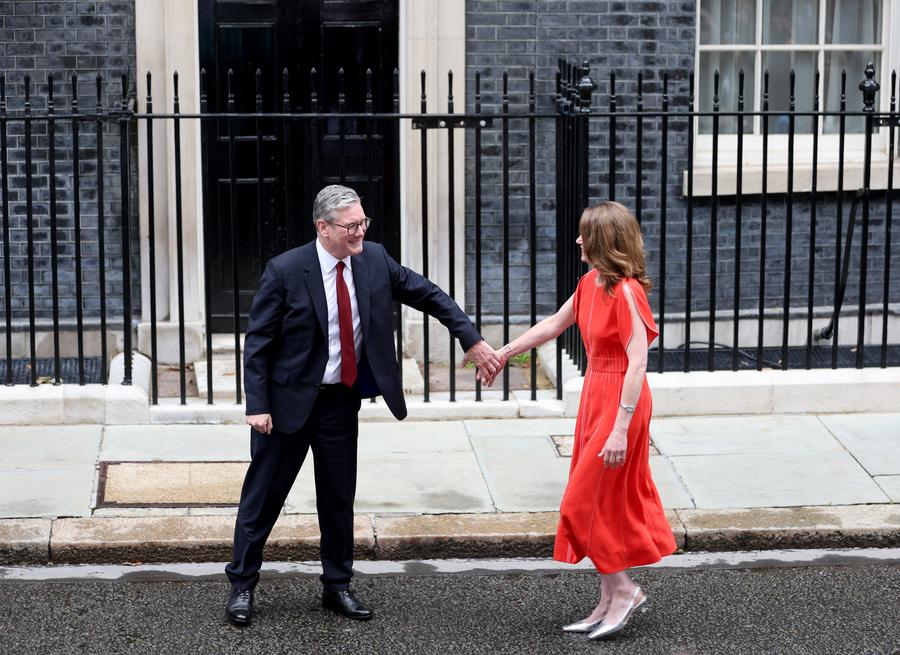Keir Starmer and his wife are pictured after his first speech as British Prime Minister in front of 10 Downing Street on July 5, 2024 in London, United Kingdom. (Xinhua/Li Ying)
“It’s an open question what kind of government they will be and how efficient they will be at achieving their stated goals.”
LONDON, July 5 (Xinhua) — Even with a landslide victory in the 2024 general election, Keir Starmer and his Labor Party will need to fully win over the British people as the percentage of the actual vote they received is very low, experts told Xinhua.
The party came to power with 412 of the 650 seats in parliament, while the Conservatives lost 121 seats.
However, in terms of percentage of the vote, Labor won around 34%, a modest difference compared to the UK Conservatives and Reformers’ roughly 24% percentage.
“The Conservative Party lost the election, but the Labor Party didn’t. He ended up with a majority, but he didn’t convince many people to vote for him,” Professor John Bryson from the University of Birmingham told Xinhua.
Rishi Sunak (right) leaves after a farewell speech at 10 Downing Street in London, United Kingdom, on July 5, 2024. (Xinhua/Li Ying)
“This means Labor won the election but did not completely win the British electorate,” Bryson said.
Given all the challenges ahead, he suggested that the Labor Party should strive to gain the sympathy of the British people so that the voter turnout would increase to reflect a more majority-style government at the next election.
The election disaster for the Conservative Party showed the level of frustration felt by the British electorate over its failure to respond to public concerns, including the cost of living crisis, an ineffective health care system and crumbling infrastructure.
The Conservatives have suffered from a lack of political confidence amid several scandals under Boris Johnson’s government, such as “partygate” and, more recently, the controversy surrounding betting on election dates by some Conservative officials.
Political instability in the summer of 2022, when the UK welcomed and sacked three Prime Ministers in two months, left voters worried about stability and consistency in policy-making and governance.
Ian Beck, a political expert at the London School of Economics and Political Science (LSE), said a Labour-led government could easily be seen as a “breath of fresh air” after 14 years of Conservative rule.
Starmer campaigned under the theme of “transformation”, pledging to rebuild England and put the interests of working people first. His party’s key promises include increasing economic growth, implementing tougher government spending rules, reducing waiting times in the National Health Service (NHS), hiring thousands of teachers, improving law and safety on Britain’s streets and strengthening border security to combat illegal immigration.
However, Labor is unclear on how to address the challenge of reviving economic growth, Beck warned.
“There’s some promise in that, rather than certainty about how they’re going to achieve it,” he said.
A woman leaves a polling station after voting in London, United Kingdom, on July 4, 2024. (Photo: Stephen Chung/Xinhua)
Steve Nolan, professor of economics at Liverpool John Moores University, had similar concerns.
“They campaigned very cautiously. They didn’t want to be the target of attacks from the Conservative opposition. They had their hands tied in many ways in terms of raising money. We didn’t raise any of the big three taxes in England, which account for two-thirds of UK revenue, and we didn’t make big promises about spending,” Nolan said.
“It’s an open question what kind of government they will be and how effective they will be in achieving their stated goals,” he said.

“Total creator. Devoted tv fanatic. Communicator. Evil pop culture buff. Social media advocate.”



